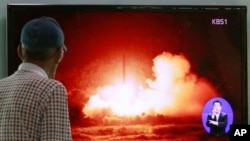The United States says it is very concerned about a new report that predicts North Korea will expand its nuclear stockpile to as many as 100 weapons by 2020. Analysts say there may be disagreements over Pyongyang’s nuclear capabilities, but there is no doubt the weapons program poses a growing international threat.
Experts on nuclear weapons technology at Johns Hopkins University's School of Advanced International Studies estimate that North Korea currently has 10 to 16 nuclear weapons and is continuing to work on its nuclear program.
Depending on the rate of production, they predict Pyongyang will expand its nuclear arsenal from 20 to 100 weapons in the next five years. The country is also likely to make technological advances to miniaturize warheads to fit onto ballistic missiles.
South Korea Defense Ministry spokesman Kim Min-seok disputed the group’s claims about North Korea’s current capability.
He said the analysis that North Korea has 10 to 16 nuclear weapons is just an assumption by some private groups and experts, and there is no evidence to support this.
Bruce Bennett, a defense analyst at the Rand Corporation, is also skeptical the country can produce 100 weapons. He said building that many would require bringing online a new nuclear reactor and pursuing a vigorous uranium enrichment program. He thinks the number will likely be around 50.
“If they have 50 nuclear weapons they can kill about 10 to 20 million people with those weapons. So that’s a huge difference and it gives them significantly more coercive power against South Korea, against Japan and against the United States,” said Bennett.
Having more nuclear weapons does not make North Korea more dangerous. Nations that possess nuclear weapons are, for the most part, restrained from using them by the idea of mutually assured destruction that would likely result from a nuclear war.
However Daniel Pinkston, a Korea analyst with the International Crisis Group, said he is concerned that Pyongyang might launch a nuclear attack based on its past authoritarian and provocative behavior.
“North Korea, because of how domestic politics work inside the country and how they use force and coercion to achieve their political aims, they may attempt to use their nuclear arsenal to achieve their goals and objectives,” said Pinkston.
Bennett can foresee scenarios where Pyongyang uses nuclear weapons in the region because of miscalculation or instability or sells nuclear weapons to non-state actors who would not hesitate to use them against the United States.
“It could try to sell them to third parties, they could be nation states that it tries to ally with. They could be terrorist groups. And if they are terrorist groups, it is very hard to deter a terrorist group and a terrorist group by and large would want to target the United States,” he said.
Shin In-kyun, an analyst with the Korea Defense Network, supports preventive military action by the U.S. and its allies to take out North Korean missile sites before they develop offensive nuclear capabilities.
He said now is the time to launch airstrikes against them, as North Korea cannot yet attack the United States with nuclear weapons.
But other analysts caution against the military option arguing that it could set off a broader conflict.
Bennett said South Korea is building a defensive system called “Kill Chain” that would use ballistic missiles, cruise missiles, aircraft and armed drones to retaliate against a North Korean missile attack. The United States has backed away from deploying a U.S. missile defense system called THADD in South Korea after China voiced concerns about it.
Recognizing and engaging North Korea as a nuclear state is not considered a politically viable option for the U.S. and its allies. Even China and Russia, considered North Korea’s friends in the region, support a nuclear-free Korean peninsula.
The six party talks that include the United States, the two Koreas, China, Russia and Japan have so far failed to persuade North Korea give up its nuclear ambitions for more aid and economic assistance.
U.N. economic sanctions imposed after North Korea conducted a nuclear test in 2013 have not yet yielded any results. But, Pinkston said, maintaining a strong strategy of deterrence and containment is the best option moving forward.
“North Korean leaders are rational. They wish to survive. I think they can be deterred. They are deterred up until today. They were deterred yesterday. So deterrence continues to work,” said Pinkston.
He said North Korea is paying a huge economic price to maintain its nuclear program, one that cannot be sustained indefinitely.
VOA News Producer Youmi Kim contributed to this report.




